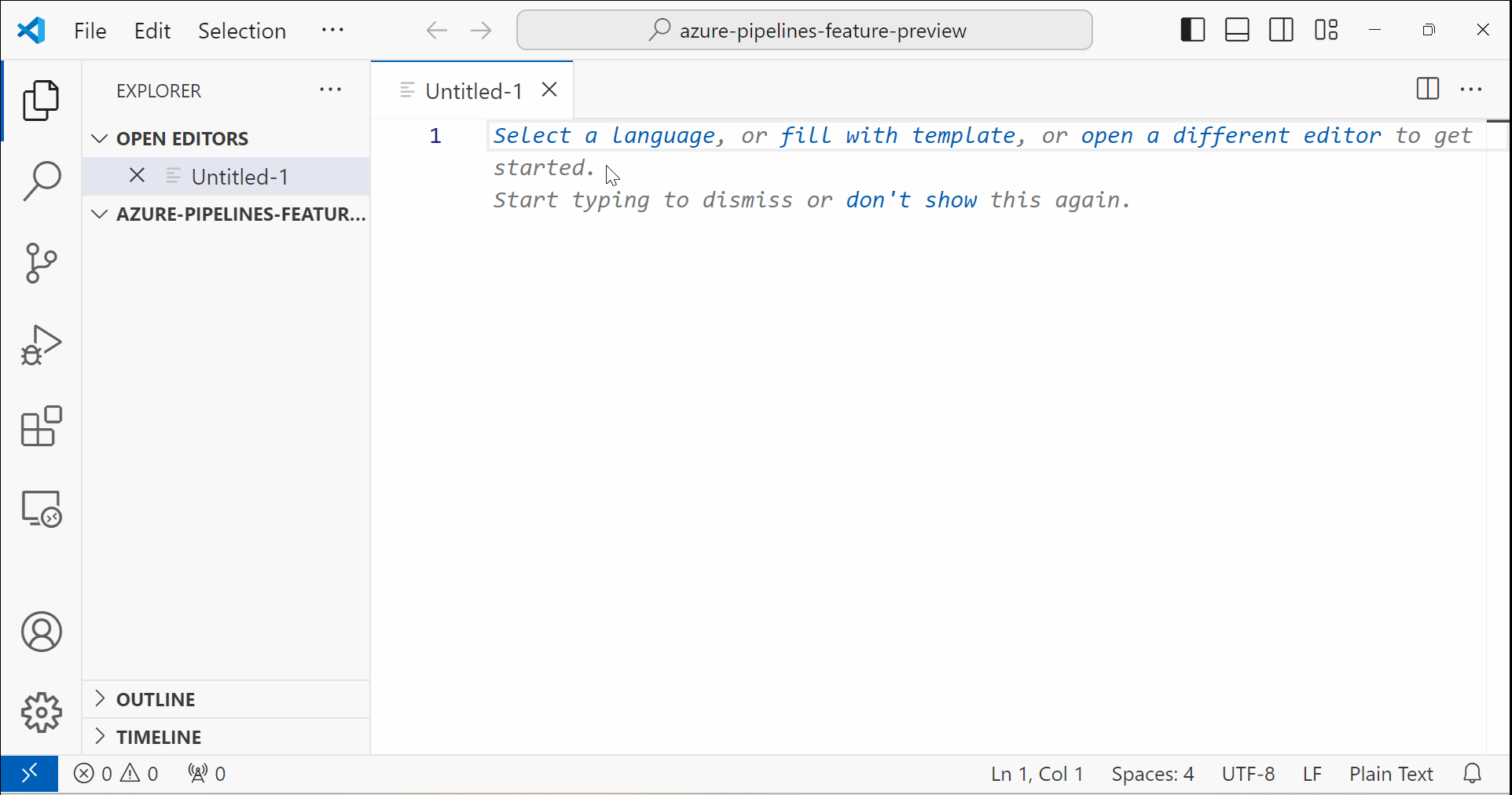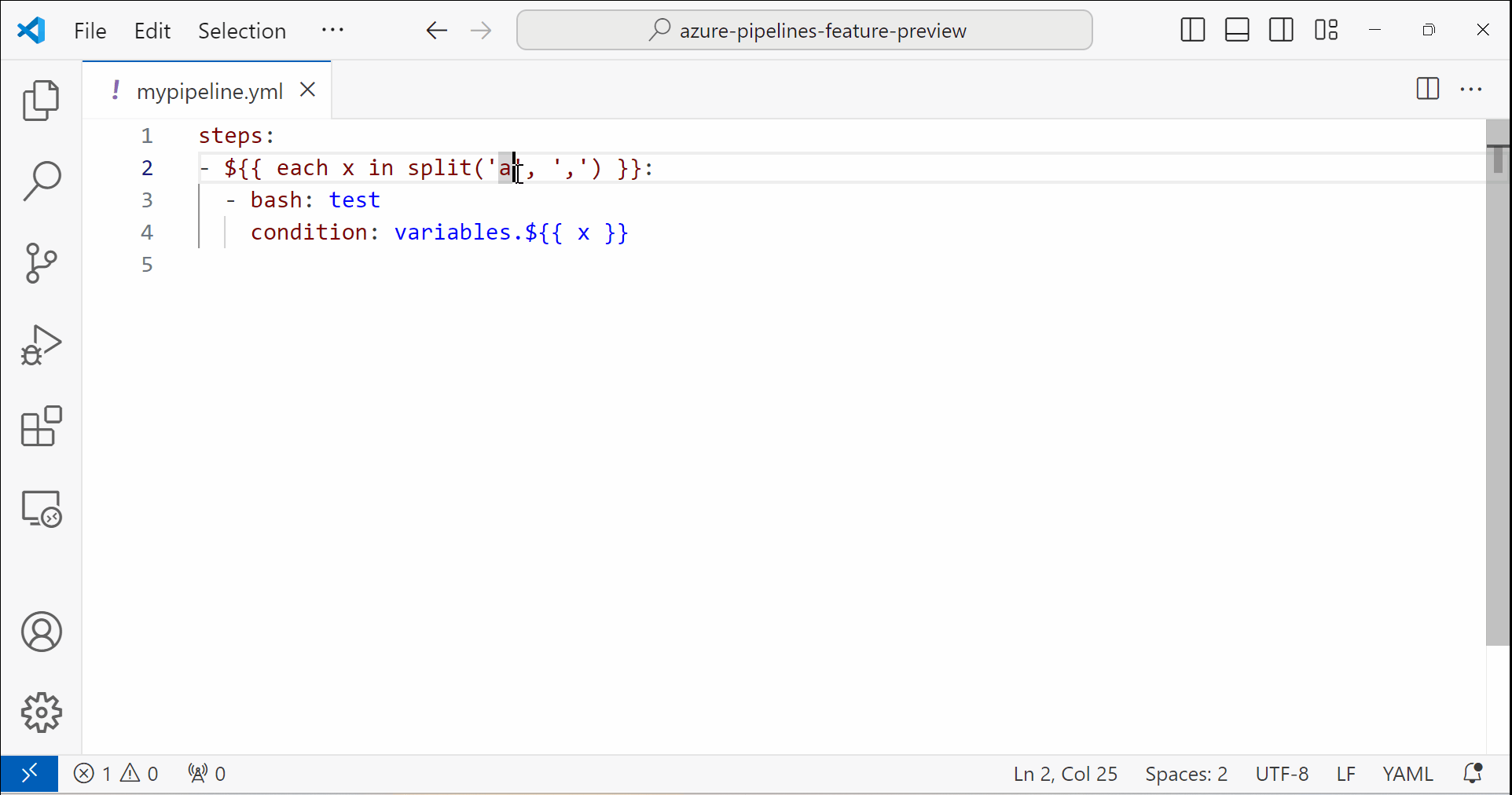The first VSCode Extension which can Validate and Expand Azure Pipeline YAML files locally without any REST service.
slow ( disabled by default )
You can try this out by enabling setting azure-pipelines-vscode-ext.enable-auto-complete (no restart needed), feedback wanted.
potentially slow ( disabled by default )
You can try this out by enabling setting azure-pipelines-vscode-ext.enable-semantic-highlighting (no restart needed), feedback wanted.
The azure-pipelines-vscode-ext.repositories settings maps the external Repositories to local or remote folders.
Syntax [<owner>/]<repo>@<ref>=<uri> per line. <uri> can be formed like file:///<folder> (raw file paths are not supported (yet?)), vscode-vfs://github/<owner>/<repository> and vscode-vfs://azurerepos/<owner>/<project>/<repository>
> Check Syntax Azure Pipeline
This command explicitly checks for syntax errors in the yaml structure and expression syntaxes.
Referenced templates are read to apply the correct schema for their parameters, if this fails this check is disabled.
These are necessary but not sufficient checks for a successful Validation of an Azure Pipeline.
> Validate Azure Pipeline
Use this command on your entrypoint Pipeline, otherwise parameters may be missing
This command tries to evaluate your current open Azure Pipeline including templates and notifies you about the result.
> Expand Azure Pipeline
Use this command on your entrypoint Pipeline, otherwise parameters may be missing
This command tries to evaluate your current open Azure Pipeline including templates and show the result in a new document, which you can save or validate via the official api.
You can configure parameters, variables, repositories per task. You can define multiple tasks with different parameters and variables or filenames to catch errors on changing template files as early as possible.
.vscode/tasks.json
{
"version": "2.0.0",
"tasks": [
{
"type": "azure-pipelines-vscode-ext",
"label": "test",
"program": "${workspaceFolder}/azure-pipeline.yml",
"repositories": {
"myrepo@windows": "file:///C:/AzurePipelines/myrepo",
"myrepo@unix": "file:///AzurePipelines/myrepo",
"myrepo@github": "vscode-vfs://github/AzurePipelines/myrepo", // Only default branch, url doesn't accept readable ref
"myrepo@azure": "vscode-vfs://azurerepos/AzurePipelines/myrepo/myrepo" // Only default branch, url doesn't accept readable ref
},
"parameters": {
"booleanparam": true,
"numberparam": 12,
"stringparam": "Hello World",
"objectparam": {
"booleanparam": true,
"numberparam": 12,
"stringparam": "Hello World",
},
"arrayparam": [
true,
12,
"Hello World"
]
},
"variables": {
"system.debug": "true"
},
"preview": true, // Show a preview of the expanded yaml
"watch": true // Watch for yaml file changes
},
{
"type": "azure-pipelines-vscode-ext",
"label": "test2",
"program": "${workspaceFolder}/azure-pipeline.yml",
"repositories": {
"myrepo@windows": "file:///C:/AzurePipelines/myrepo",
"myrepo@unix": "file:///AzurePipelines/myrepo",
"myrepo@github": "vscode-vfs://github/AzurePipelines/myrepo", // Only default branch, url doesn't accept readable ref
"myrepo@azure": "vscode-vfs://azurerepos/AzurePipelines/myrepo/myrepo" // Only default branch, url doesn't accept readable ref
},
"parameters": {
"booleanparam": true,
"numberparam": 12,
"stringparam": "Hello World",
"objectparam": {
"booleanparam": true,
"numberparam": 12,
"stringparam": "Hello World",
},
"arrayparam": [
true,
12,
"Hello World"
]
},
"variables": {
"system.debug": "true"
},
"watch": true // Watch for yaml file changes
}
]
}Sample Pipeline which dumps the parameters object
parameters:
- name: booleanparam
type: boolean
- name: numberparam
type: number
- name: stringparam
type: string
- name: objectparam
type: object
- name: arrayparam
type: object
steps:
- script: echo '${{ converttojson(parameters) }}'
- script: echo '${{ converttojson(variables) }}'Sample output for task with label test
stages:
- stage:
jobs:
- job:
steps:
- task: CmdLine@2
inputs:
script: |-
echo '{
"booleanparam": true,
"numberparam": 12,
"stringparam": "Hello World",
"objectparam": {
"booleanparam": true,
"numberparam": 12,
"stringparam": "Hello World"
},
"arrayparam": [
true,
12,
"Hello World"
]
}'
- task: CmdLine@2
inputs:
script: |-
echo '{
"myvar": "testx",
"system.debug": "true"
}'- Make changes in multiple dependent template files and show a live preview
- Everything is done locally and works offline
- You can run template files with the same template engine locally via the Runner.Client and Server tool using the official Azure Pipelines Agent
Runner.Client azexpand -W azure-pipeline.ymlworks like Validate Azure Pipeline by only checking the return value to be zeroRunner.Client azexpand -q -W azure-pipeline.yml > final.ymlworks like Expand Azure Pipeline, but directly writes the expanded file to diskRunner.Client azpipelines -W azure-pipeline.ymlto test Azure Pipelines locally via the official agent--interactiveand--watchallow to iterate even faster by keeping the local server and agent running
- Less trial and error commits
- Works side by side with the official Azure Pipelines VSCode extension
- May contain different bugs than the Azure Pipelines Service
- You can self-host Azure Devops Server and commit your changes to your local system with more accurate results of the template engine
- Missing predefined Variables, feel free to add them manually as needed
I'm happy to review Pull Requests to this repository, including Documentation / Readme updates or suggesting a new icon for the vscode extension.
npm install
dotnet workload install wasm-tools
npm run build- Run vscode target "Run azure-pipelines-vscode-ext Extension" to test it
- https://christopherhx.github.io/runner.server/azure-pipelines-vscode-ext/azure-pipelines-vscode-ext.vsix
- https://christopherhx.github.io/runner.server/azure-pipelines-vscode-ext/azure-pipelines-vscode-ext-pre-release.vsix
- same as first one, but marked as pre-release if you install it



